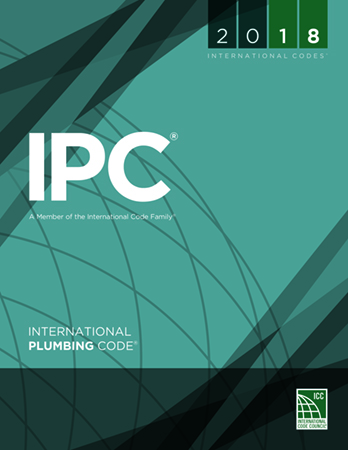
IPC
Overview of the International Plumbing Code® (IPC®)
The International Plumbing Code® (IPC®) establishes minimum requirements for plumbing systems using prescriptive and performance-related provisions. It is founded on broad-based principles that make possible the use of new materials and new plumbing designs. This 2018 edition is fully compatible with all of the International Codes® (I-Codes®) published by the International Code Council. The I-Codes, including this International Plumbing Code, are used in a variety of ways in both the public and private sectors.
Benefits of the IPC:
Most industry professionals are familiar with the I-Codes as the basis of laws and regulations in communities across the U.S. and in other countries. However, the impact of the codes extends well beyond the regulatory arena, as they are used in a variety of nonregulatory settings.
- Voluntary compliance programs such as those promoting sustainability, energy efficiency and disaster resistance.
- The insurance industry, to estimate and manage risk, and as a tool in underwriting and rate decisions.
- Certification and credentialing of individuals involved in the fields of building design, construction and safety.
- Certification of building and construction-related products.
- U.S. federal agencies, to guide construction in an array of government-owned properties.
- Facilities management.
- “Best practices” benchmarks for designers and builders, including those who are engaged in projects in jurisdictions that do not have a formal regulatory system or a governmental enforcement mechanism.
- College, university and professional school textbooks and curricula.
- Reference works related to building design and construction.
In addition to the codes themselves, the code development process brings together building professionals on a regular basis. It provides an international forum for discussion and deliberation about building design, construction methods, safety, performance requirements, technological advances and innovative products.
Code Development
Current Version: 2018 IPC
- Purchase the newest edition of the code and references.
Upcoming Version: 2021 IPC Development
This 2018 edition presents the code as originally issued, with changes reflected in the 2003 through 2015 editions and with further changes approved by the ICC Code Development Process through 2017. A new edition such as this is promulgated every 3 years.
This code is founded on principles intended to establish provisions consistent with the scope of a plumbing code that adequately protects public health, safety and welfare; provisions that do not unnecessarily increase construction costs; provisions that do not restrict the use of new materials, products or methods of construction; and provisions that do not give preferential treatment to particular types or classes of materials, products or methods of construction.
- Get the 2021 code development schedule.
- Learn more about ICC's web-based code development process, cdpACCESS.
Adoptions of the IPC
The International Plumbing Code (IPC) is in use or adopted in 36 states, the District of Columbia, Guam, and Puerto Rico.
As a model code, the IPC is intended to be adopted in accordance with the laws and procedures of a governmental jurisdiction. When adopting a model code like the IPC, some jurisdictions amend the code in the process to reflect local practices and laws.

